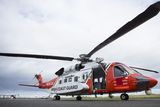Will seismic political shifts sink Ireland's offshore explorers?
Geology has long been an unforgiving risk factor in the Irish offshore sector, but energy explorers now face greater threats, writes Fearghal O'Connor
Oil and gas explorers such as Providence Resources are under financial pressure to make new discoveries off the Irish coast, while political opposition to fossil fuels is growing as calls for greener energy continue to be made
In days gone by, the pubs around Cork's docks would have been alive with rumour and speculation if a major multi-million-dollar exploratory oil well was being drilled off the Irish coast. Sailors from the service vessels travelling 230km out into the Atlantic to stock the rig would have been closely questioned on their return by intrepid oil and gas shareholders, to find out what equipment was aboard their ship, says veteran exploration investor John Teeling.
"What they'd really be trying to find out is if the rig was bringing out blow-out preventers...they're the things that stop the whole rig being blown out of the water if they have hit a pocket of gas," says Teeling.
But, for now, there is little intelligence to be had from the estimated $100m-plus (€90m) well that has been drilled this summer by oil major ExxonMobil and a subsidiary of Chinese state oil company CNOOC into 2km of water and a further 6km of rock at the Porcupine Basin.
Nevertheless, the answers it reveals - due any day now but not guaranteed to be published in any great detail - are eagerly awaited by anyone with an interest in Irish offshore exploration.
A positive strike could be transformative at a time when the Irish offshore exploration sector certainly needs a boost.
Only a big oil or gas find is likely to divert attention away from the travails of the most high-profile Irish player in the hunt for hydrocarbons in the offshore market. Providence Resources is currently in a very different type of waiting game. It has set tomorrow as the latest deadline for it to receive €9m in crucial cash promised to it by its Chinese partner APEC Energy Enterprise, as part of a deal between the two to develop Ireland's first commercial oilfield at Barryroe, 50km off the Cork coast.
In recent weeks, Providence has made nine of its 13 staff redundant, including key technical personnel, and since the original deadline for the payment was missed in June, the company's share price has bobbed around like a boat adrift on an Atlantic swell, as each new deadline has passed.
And with every missed deadline, some industry observers believe that the clouds are darkening over the entire Irish offshore sector - an industry that has faced challenges on a number of fronts over recent months.
Providence's Barryroe project - since it was announced with great fanfare in 2012 as a find with commercial potential - has been the flagship scheme for the sector here. With proven oil in the ground, it will be a huge blow to the industry if it cannot be brought over the line.
Providence CEO Tony O'Reilly remains upbeat about the Barryroe project ahead of tomorrow's deadline. He rejects the notion that the Barryroe funding issue - as well as the results from ExxonMobil - are potentially life or death moments for the entire oil and gas sector here.
"I wouldn't subscribe to that," says O'Reilly. "The Irish industry has gone through ups and downs since it got going in the 1970s. You've had moments of heightened activity and moments of reduced activity. There are some headwinds but there's also an appetite and the need.
"From offshore Ireland's perspective, there have never been more licences issued and there's never been more companies operating offshore Ireland. This is, I would think, a positive. It's quite amazing to see the calibre of companies who have chosen to invest in Ireland."
Providence has, over the past decade, followed a portfolio approach - of which Barryroe is the most advanced of a number of prospects and targets in Irish waters - and it has joined forces with various major global players on each.
"So my take on Ireland right now is that there are certainly more headwinds than we've had in recent years. But the promise is still there," says O'Reilly.
Nevertheless, the delays in the arrival of the Chinese money have focused attention on Providence's accounts, rather than the geological and seismic reports it would prefer to talk about. If the money does not arrive, the company may be forced to look at alternative funding, likely through debt financing or a share placing.
"Our working capital position is such that if funds aren't forthcoming within a certain period of time, then we would obviously have to look at alternative financing. That's what one does. So by saying it, you can assume that we've looked at it, but that's not our primary objective."
O'Reilly insists that his focus is "for us to move forward with the site survey, the consenting and to get the multi-well programme carried out".
He remains hopeful that the company can drill three to four wells over the next number of years on its key targets. But, he says, whether that happens will be down to Providence's joint venture partners, such as Total and ENI.
"It's about now realising that it's harvest time. You've got the acreage, you've done the sub-surface science work, in terms of seismic and evaluation. So it's really about drilling wells and testing the veracity of the model that one has about the hydrocarbon potential."
But not everyone in the industry is as upbeat. Teeling, who has had an involvement over the years in companies that have had a part to play in up to five wells drilled off the Irish coast, believes that the Irish offshore sector is no longer a sensible place for investors such as himself.
"The exploration industry in this country is in very, very serious difficulty. I am very disillusioned with the Irish offshore," he says.
He and his partners in exploration company Petrel Resources have brought in new shareholders and "we are going to redirect our efforts toward the Middle East again".
He added: "I just don't see any future in the Irish offshore. There is huge potential there but also huge risks, so we believe that we are better off going to places like Iraq and Libya because at least we know the oil is there."
Ireland's great hydrocarbon frontier has long been the Porcupine Basin but over the past 17 years, there have been just three wells drilled there. That compares with more than 200 wells drilled in the North Sea over the past decade.
That drilling rate could soon fall to zero and the entire industry could wither away if political parties such as the Green Party and People Before Profit succeed, as they almost did earlier this year, in pushing through legislation to ban any further exploration in the Irish offshore.
Green Party leader Eamon Ryan has little time for the sector, despite the fact that as energy minister more than a decade ago, he himself issued exploration licences in the hope of reducing Ireland's dependence on imported fossil fuels. "It is all speculative gambling because, based on our drilling record over the last 50 years, the odds of a successful strike are probably 40 or 50 to one. That's the truth," he says.
Ryan is once again a potentially important figure when it comes to the future of the industry. If the Greens were to repeat in a general election their strong showing at the last local and European elections, he could potentially hold the balance of power and find himself in a position to demand a ban on exploration as a price for supporting a new programme for government.
"There's a clear majority against new offshore oil and gas exploration. It's over. It's one of the easy things for us to fix. The big climate projects are going to be in transportation, agriculture and land use. If we can't do the easy ones, how can we do the hard ones? I just don't see that as one that would be a difficult negotiation. That's probably in the first five minutes of any programme for government negotiation," he says.
Ryan believes that even if an argument is made by the industry that drilling for oil and gas off the Irish coast makes sense as a way to try to ensure security of energy supply, the potential damage to the climate of unleashing as-yet-undiscovered Atlantic oil and gas is reason enough to put a halt to the search.
"The truth is if we're going to go and take the deepwater Atlantic oil and gas out of the ground at a hundred dollars a barrel plus, which is what it will cost, well the world is cooked," says Ryan.
"Because if that is brought out of the ground, everything that's cheaper is going to have come out of the ground first, before it comes out of one of the most hostile environments. We can't just let that happen. How much carbon can we put up in the atmosphere? We know we have to keep four fifths of known reserves in the ground and that's before we discover anything new in the North Atlantic margin."
He believes that anyone investing in the Irish oil and gas exploration sector is backing "a loser".
"It's going to shut down in my mind within a year - max. Because there's going to be a revised programme for government at some stage in the next year. I will eat my political hat if any new government extends new licensing arrangements because you cannot say you are taking climate change seriously and do that at the same time.
"It's over. That money that anyone is speculating on would be better invested in the alternative, which is renewable energy and offshore wind."
He believes that a company like Providence would be better-served refocusing its skills and expertise on developing renewable energy in the waters around Ireland.
"If they were going out with a call for partners and investors to help develop floating offshore platforms for renewable energy off the west coast of Ireland, they'd be massively oversubscribed and the cash would roll in, because everyone knows that is what is coming. It's similar-type skills to putting an oil rig in the Atlantic to putting a wind turbine there. They should recognise that the day of the speculative offshore industry is over and that the day of renewables is to come, and they should make the switch," says Ryan.
Providence has in fact established a small renewable energy sub-division that is focused on areas such as geothermal energy, and carbon capture and storage, says O'Reilly, who agrees diversification is important.
"But there are some fundamental leaps. Offshore wind, floating wind, is a technological leap in itself. And there's planning considerations. There's foreshore considerations. Legislation needs to be sorted out for all of this," he says. The oil industry executive is not about to concede the ground to the Green Party leader any time soon. O'Reilly argues that Ryan is ignoring the fact that the move to renewable energy is going to require a transition period, in which gas in particular will play a key role.
He cites a recent report by consultants Wood Mackenzie that found although wind and solar will contribute 24pc of global power supply by 2040, up from just 7pc today, 85pc will still come from fossil fuels. Even presuming Ireland can outperform this, gas, the cleanest of the fossil fuels, will still be a key component of the energy mix, says O'Reilly. Without exploration, that could leave us completely dependent on gas from Russia, that first comes through a post-Brexit Britain.
He says: "Thank god we have Corrib. If we didn't, we'd be importing 100pc of our gas. It is one of the great assets for this country. And again, people take it for granted. They don't realise where their energy comes from. And security of supply is a hugely important thing. And it's important for the IDA when they're out selling into the world at large Ireland as a destination. Investors will want to know that when they put a manufacturing facility here or set up offices that there is a secure, reliable source of energy, and Corrib has played a fantastic role in that regard."
Corrib, however, is set to run out over the next decade and the hope of finding a replacement gas supply continues to drive exploration. British-based Europa Oil & Gas is currently focused on exploration blocks close to the existing Corrib field. Europa CEO Hugh Mackay believes that a big gas find could utilise the existing Corrib infrastructure and that such a find is a very real prospect. The company has been active in the Irish offshore sector since 2011 and is currently active on five separate licences, one of which was just extended by the Government.
"We've got a big acreage position and we've made a substantial financial commitment to Ireland over the years, in excess of €20m, which is a lot for a small company. So we've currently got an application in for a site survey. And our hope is to bring in a partner and drill a well, and prove up or find a one and a half tcf [trillion cubic feet] gasfield, which would compare to Corrib, which is about a tcf of gas."
This, he says, would be a big win for the firm, for the Corrib field itself, but also for Ireland.
"It would mean that there is potentially 30 years of gas supply coming out of the current infrastructure, rather than 15," he says. "From what I have seen, Ireland will be consuming hydrocarbons for the foreseeable future; it will be consuming gas, and it will be consuming oil. The European Union imports 75pc of its oil demand, and currently is on 50pc of its gas demand. European oil and gas production is in long-term decline, so assuming that the demand remains flat, then Europe will become ever more reliant on imports. And to me, if you're going to transport gas to Ireland, why wouldn't you want to bring it in over 80km of pipeline rather than from 1,000km away?"
But Mackay says the very public political debate about the future of the industry in Ireland has cast a long shadow.
"We're currently paying a lot of attention to it. Ultimately, you want to be working in a country where they actually want an oil and gas industry. When I joined the industry, over 30 years ago, we were primarily worried about geology and sub-surface risk. Now, to a much greater extent than before, you're thinking about political risk."
The vagaries of geology are a risk many in the industry have long been happy to bet against. But could seismic shifts that may lie ahead for the Irish political system prove a bet too far for an industry long accustomed to taking a chance?
Irish oil and gas finds
Kinsale: The Kinsale Head Gas Field was discovered in 1971 by the US company Marathon Oil Corporation. It lies 50km off the coast of Co Cork in 90 metres of water. It is now close to the end of its productive life, but is still the largest single hydrocarbon discovery made in Ireland, with a number of subsequent discoveries tied back into the infrastructure. The onshore pipeline infrastructure created to transport the gas became the basis of the Bord Gáis network.
Corrib: Enterprise Oil first drilled the Slyne Trough 83km off Erris Head in Co Mayo in 1997, before the company was bought out by Shell in 2002. Development of the trillion-cubic-foot gas find began in 2004 and only then did the challenges for the project really kick off, when local people and others began a protest that ultimately failed to halt the project.
Barryroe: It had long been known that there was at least some oil beneath the Celtic Sea off Cork, but in March 2012, Providence Resources announced the results of drilling that showed flow rates far exceeding pre-drill expectations, making it the prime candidate to become Ireland’s first commercial oil field. Achieving this has been a tortuous process since, and Providence now awaits promised funding from its Chinese farm-out partner.
Join the Irish Independent WhatsApp channel
Stay up to date with all the latest news














